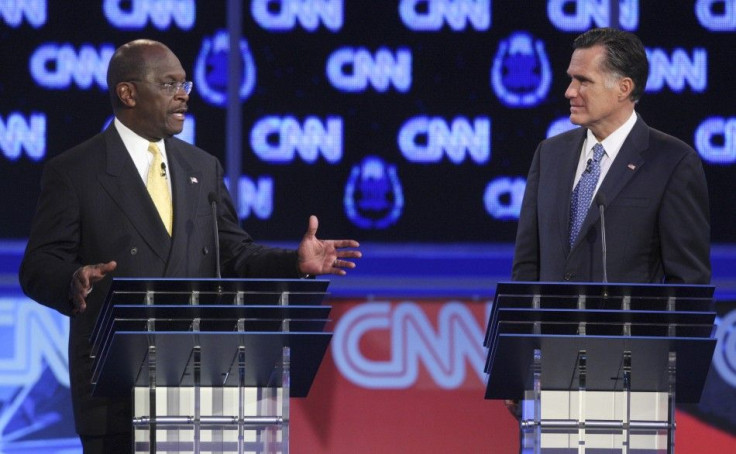Romney, Cain Lead in Iowa With Little Effort: Who Will Win the Caucuses?
ANALYSIS

The results of the Iowa caucuses are still anyone's guess.
In a CNN/Time/ORC poll released Wednesday, Mitt Romney led Herman Cain by a small margin, 24 percent to 21 percent, followed by Ron Paul with 12 percent and Rick Perry and Newt Gingrich with 10 percent each.
Those were essentially the same standings as shown in an Oct. 11 NBC News-Marist poll, except with Michele Bachmann replacing Gingrich: 23 percent for Romney, 20 percent for Cain, 11 percent for Paul and 10 percent each for Perry and Bachmann. Romney's lead is within the margin of error in both polls.
What's more remarkable than the numbers themselves, though, is that Romney and Cain have managed to stay far ahead of the pack in Iowa without campaigning actively there. They have been much more focused on New Hampshire and South Carolina and haven't made much of a push for Iowa at all -- and yet one of them will most likely win there.
Iowa's history, in which grassroots campaigning has been exceptionally important, says that shouldn't be possible.
Bachmann, Paul, Perry and Rick Santorum have spent the most time on the ground in Iowa. All but Santorum -- who isn't doing well anywhere -- are polling respectably in the state, with Paul holding down third place behind Romney and Cain.
That Romney and Cain are beating them by such a wide margin with little to no effort in Iowa would seem to back up the notion that it has become a two-man race for the Republican nomination. And now that they realize how good a chance they have in Iowa, the two front-runners are beginning to campaign more heavily there, which could solidify their leads.
The GOP Race, To-Date
It isn't over yet, though. No one has this thing locked up, and it's not even close, a source described only as a top Republican operative, told ABC News. No one has the organization that they need in place right now to turn people out to 1,784 caucuses across the state. The newcomers to the race don't really understand that, and the one person who does understand that is not fully invested here -- and that's Romney.
The question is, as the race for Iowa heats up and Romney's leads in other early states like New Hampshire look increasingly certain, will he become more invested in the Hawkeye state?
If Romney does manage to win Iowa -- which would be an upset not just because he hasn't campaigned there, but also because the Iowa caucuses normally hinge on socially conservative voters -- and then wins New Hampshire the following week, as he's expected to do, he could wrap up the nomination in the first two contests, making the other 48 primaries and caucuses almost formalities.
If Romney wins Iowa and then goes on to win New Hampshire, it is going to basically knock out most of his conservative challengers, money is going to pour in for him, and he's basically going to have it won, Craig Robinson, the founder and editor of TheIowaRepublican.com, told ABC News.
© Copyright IBTimes 2024. All rights reserved.











